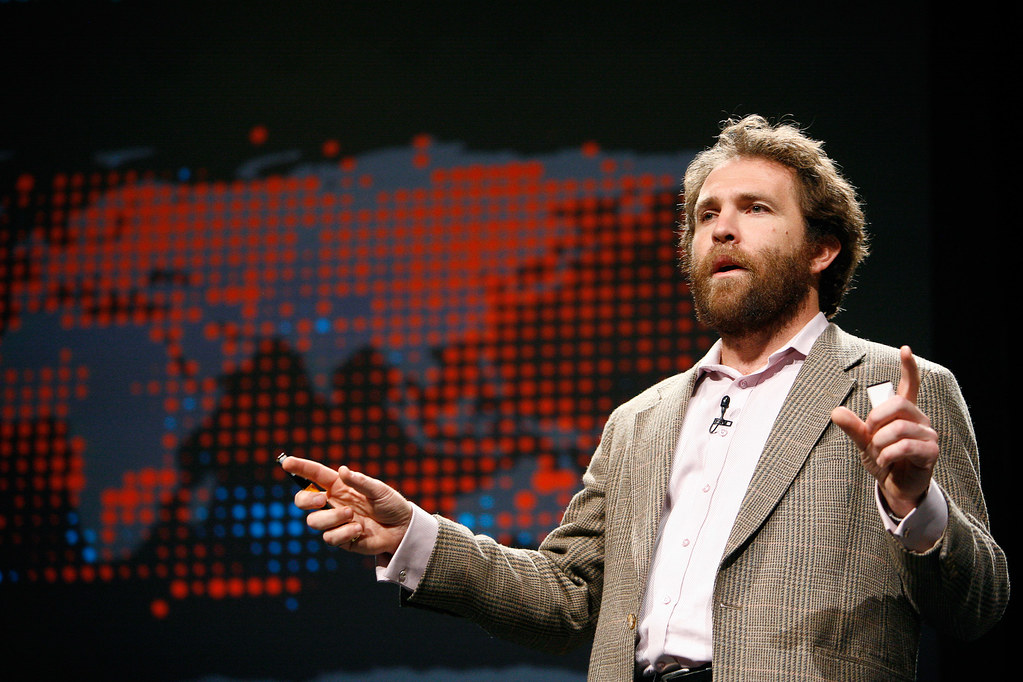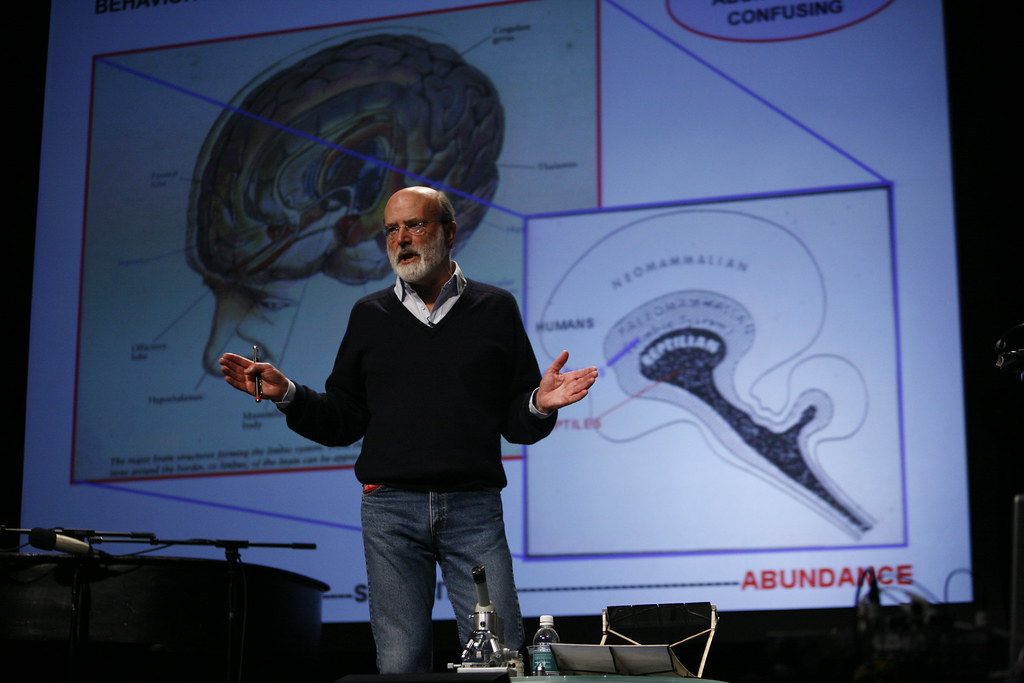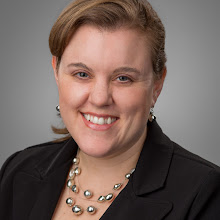Saul Griffith

He has calculated his entire energy usage for his lifetime - including the energy used to create the things he purchases like bottled water, his laptop, and the NY Times that gets delivered to his front door every morning. You can calculate your energy usage too at Wattzon.com. He provided a summary about our global energy usage and how it will impact our environment.
His analysis shows that we need to product more energy fast over the next 25 years (akin to one solar panel a second...and he outlines how fast we need to produce other types of energy production). We also need to reduce our energy usage so that those in the developing world who currently don't have access to electricity.
So his plan to reduce his energy footprint? Massive reduction in travel (Pop!Tech had to work hard to get him to fly to Maine to speak), eliminating his bottle of water per day, becoming a vegetarian, etc. It certainly made me think about reducing my purchases of bottled drinks.
He also advocated for companies to develop products to last longer. I couldn't agree more. Considering I grew up in Maine with a family that made things last, bought things second hand, etc. I can't agree more that we should move away from our disposable culture, learn how to mend clothing, and focus on reducing our "stuff" and keeping our "stuff" longer.
Malcom Gladwell

Malcom is always interesting to listen to. In his presentation, he's taken on the idea that some talents are genetically determined (like the myth that Kenyans are better at running) and has instead looked at the data and discovered that it has everything to do with how young people's talent is nurtured. For instance, boys in Kenyan run 5 to 10 miles per day. Compare that to how inactive American boys are, and you can see why our athletes might not be as good at long distant running. So there isn't a scarcity in talent, we just are not preparing our youth effectively to capitalize on their talents.
Peter Wybrow

Peter has written a book about what happens to people when we live in a society of abundance and explored the addictive cycle of living with abundance from a physiological perspective. He highlighted the elements that drive humans engagement in our economy: self interest, curiosity, a competition for resources, and social ambition. I can't help but wonder how we balance our innate curiosity-- exploring new ideas and things-- with our need to keep products for 10 years to sustain our ecological health.
Our 24/7, always-on economy surrounds us with stress and a sense of urgency, and creates an environment of low face-to-face people interaction, and it fuels our addiction. It turns otu Starbucks is a part of the vicious cycle. On one slide Peter mentions that Starbucks coffee has 8 times the caffeine in an average cup of coffee. Isn't that crazy? I had always wondered why their coffee made me more jittery.
I was very aware of the negative impacts of this type of life style. Last year's Poptech speaker who talked about the slow movement really helped me re-focus on trying to get more sleep, and increase the amount of face-to-face interaction I had with other people. Studies show that sleep deprivation makes you gain weight because it decreases your ability to control your cravings for high caloric foods. So while Peter didn't provide a 12 step program for breaking the cycle of addiction like I would have hoped, I was re-energized to sleep more, keep up the exercise, increase my face-to-face time with people, and attempt to make my life more simple and less consumer driven. Less stuff, more quality experiences. My family's commitment to having experiences together around Christmas instead of buying each other stuff has always felt "right" but now makes even more sense to me.
One of the themes emerging from Pop!Tech this year, and re-iterated during Peter's presentation was a historical look at the impact that scarcity has on human behavior. In Peter's presentation he looked at the Renaissance - a period of great poverty but also a period of great creativity and innovation. Considering our current economic climate, and considering I'm an optimist, I think I'm going to focus on how scarcity will bring unknown great art and technological innovation.
So his plan to reduce his energy footprint? Massive reduction in travel (Pop!Tech had to work hard to get him to fly to Maine to speak), eliminating his bottle of water per day, becoming a vegetarian, etc. It certainly made me think about reducing my purchases of bottled drinks.
He also advocated for companies to develop products to last longer. I couldn't agree more. Considering I grew up in Maine with a family that made things last, bought things second hand, etc. I can't agree more that we should move away from our disposable culture, learn how to mend clothing, and focus on reducing our "stuff" and keeping our "stuff" longer.
Malcom Gladwell

Malcom is always interesting to listen to. In his presentation, he's taken on the idea that some talents are genetically determined (like the myth that Kenyans are better at running) and has instead looked at the data and discovered that it has everything to do with how young people's talent is nurtured. For instance, boys in Kenyan run 5 to 10 miles per day. Compare that to how inactive American boys are, and you can see why our athletes might not be as good at long distant running. So there isn't a scarcity in talent, we just are not preparing our youth effectively to capitalize on their talents.
Peter Wybrow

Peter has written a book about what happens to people when we live in a society of abundance and explored the addictive cycle of living with abundance from a physiological perspective. He highlighted the elements that drive humans engagement in our economy: self interest, curiosity, a competition for resources, and social ambition. I can't help but wonder how we balance our innate curiosity-- exploring new ideas and things-- with our need to keep products for 10 years to sustain our ecological health.
Our 24/7, always-on economy surrounds us with stress and a sense of urgency, and creates an environment of low face-to-face people interaction, and it fuels our addiction. It turns otu Starbucks is a part of the vicious cycle. On one slide Peter mentions that Starbucks coffee has 8 times the caffeine in an average cup of coffee. Isn't that crazy? I had always wondered why their coffee made me more jittery.
I was very aware of the negative impacts of this type of life style. Last year's Poptech speaker who talked about the slow movement really helped me re-focus on trying to get more sleep, and increase the amount of face-to-face interaction I had with other people. Studies show that sleep deprivation makes you gain weight because it decreases your ability to control your cravings for high caloric foods. So while Peter didn't provide a 12 step program for breaking the cycle of addiction like I would have hoped, I was re-energized to sleep more, keep up the exercise, increase my face-to-face time with people, and attempt to make my life more simple and less consumer driven. Less stuff, more quality experiences. My family's commitment to having experiences together around Christmas instead of buying each other stuff has always felt "right" but now makes even more sense to me.
One of the themes emerging from Pop!Tech this year, and re-iterated during Peter's presentation was a historical look at the impact that scarcity has on human behavior. In Peter's presentation he looked at the Renaissance - a period of great poverty but also a period of great creativity and innovation. Considering our current economic climate, and considering I'm an optimist, I think I'm going to focus on how scarcity will bring unknown great art and technological innovation.


No comments:
Post a Comment